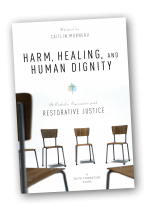First Week of Lent: When We Think About Justice
"Jesus came to Galilee proclaiming the gospel of God: 'This is the time of fulfillment. The kingdom of God is at hand. Repent, and believe in the gospel.'" (Mark 1:12-15)
In Sunday’s Gospel, Saint Mark gets right to the point: “Repent and believe in the Gospel,” he writes.
As we begin our Lenten exploration of restorative justice, we are invited to consider our possibilities for repentance — not only in instances where we have caused harm, but also those where we have been harmed ourselves.
If all God's children are called to "repent and believe in the Gospel," what does that mean for those who have committed unspeakable crimes? Is punishment the only way to respond, or can we offer these individuals opportunities to repent?
The words of Pope Francis in his latest encyclical, Fratelli Tutti, offer an answer:
“Each day offers us a new opportunity, a new possibility... We have the space we need for co-responsibility in creating and putting into place new processes and changes. Let us take an active part in renewing and supporting our troubled societies. Today we have a great opportunity to express our innate sense of fraternity, to be Good Samaritans who bear the pain of other people’s troubles rather than fomenting greater hatred and resentment. Like the chance traveler in the parable, we need only have a pure and simple desire to be a people, a community, constant and tireless in the effort to include, integrate, and lift up the fallen" (Fratelli Tutti 77).
Video: A New Story of Justice: Nonviolence and Restorative Justice (Time 3:30)
We invite you to watch the video below from the Metta Center for Nonviolence Education, which offers a sense of what these “new possibilities" for repentance and renewal which Pope Francis describes might look like.
Reflection and Sharing
- What image in the video spoke to you?
- What image puzzled and/or challenged you?
Restorative Justice and Catholic Social Teaching: Inalienable Human Dignity
As we reflect on restorative justice in the light of the Lenten Gospels, we begin to see how the roots of all Catholic Social Teaching principles are embedded in the words and deeds of Jesus. Therefore, exploring restorative justice through the lens of Catholic Social Teaching principles will help illuminate ways that restorative practices can transform individual relationships, communities, and systems in the spirit of healing and reconciliation.
At the core of all Catholic Social Teaching is the principle that every person is created in the image and likeness of God and therefore has inalienable human dignity — no matter the harm one has suffered or caused. Despite this, our U.S. criminal legal system often fails to recognize the inalienable dignity of those involved in harm or wrongdoing. Consider the following:
When crime happens, the U.S. legal system asks:
1. What law was broken?
2. Who is guilty?
3. How should they be punished?
By contrast, restorative justice asks:
1. What was the harm?
2. Who has been harmed?
3. What are the needs?
4. Whose obligations are these?
5. What should be done to put things right?
By first asking “what was the harm?” or “whose dignity was violated and how?”, restorative justice upholds that the dignity and needs of each person must be at the center of a response to harm, no matter their role, because no person is disposable. If there were oppressive systems or conditions that contributed to the harm, the common good demands addressing those injustices as well.
Reflection and Sharing
-
What comes to mind when you hear the word justice? Does thinking about “restorative justice” shape your understanding of justice?
-
This Lent, as you "repent and believe in the Gospel," where is there a need for restoration in your life? With those around you?
Prayer
Lord, I am weary from the weight of brokenness and division in our world, in the criminal justice system, and in my own life. In you I find hope for redemption and know that you will show me a better way, a more restorative way. Guide my path as I seek to be a messenger of mercy, justice, and human dignity for all people, most especially those impacted by crime and the criminal justice system.
Next Steps
1. Download and share CMN’s “What is Restorative Justice?” One-Pager
2. Read the second chapter of Harm, Healing, and Human Dignity in preparation for Week Two

Restorative Justice in Light of the Lenten Gospels is a weekly Lenten series that follows along with Catholic Mobilizing Network's faith formation guide, Harm, Healing, and Human Dignity: A Catholic Encounter with Restorative Justice (Liturgical Press, 2019).






